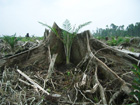 Wilmar, named the "worst company in the world" by Newsweek, and 22 other oil palm companies are considered to be responsible for tropical deforestation, according to the Norwegian Government Pension Fund Global (GPFG). GPFG’s investments in the palm oil industry are reduced by more than 40 per cent. "This is a major step forward and a victory for the remaining rainforests. One of the world’s biggest investors sends a clear signal to the oil palm industry that its destructive practices are unacceptable. Now other investors should follow the example" says Nils Hermann Ranum at Rainforest Foundation Norway. The GPFG annual report for 2012 was launched in Oslo today, and reveals that the activities of Wilmar International Ltd, Astra International Tbk PT and 21 other oil palm companies are incompatible with the Fund’spolicy on risk related to climate change and tropical deforestation. As a consequence all stakes in the 23 oil palm companies were sold in 2012."
Wilmar, named the "worst company in the world" by Newsweek, and 22 other oil palm companies are considered to be responsible for tropical deforestation, according to the Norwegian Government Pension Fund Global (GPFG). GPFG’s investments in the palm oil industry are reduced by more than 40 per cent. "This is a major step forward and a victory for the remaining rainforests. One of the world’s biggest investors sends a clear signal to the oil palm industry that its destructive practices are unacceptable. Now other investors should follow the example" says Nils Hermann Ranum at Rainforest Foundation Norway. The GPFG annual report for 2012 was launched in Oslo today, and reveals that the activities of Wilmar International Ltd, Astra International Tbk PT and 21 other oil palm companies are incompatible with the Fund’spolicy on risk related to climate change and tropical deforestation. As a consequence all stakes in the 23 oil palm companies were sold in 2012."
In the first quarter of 2012 we sold our stakes in 23 companies that by our reckoning produced palm oil unsustainably. Before reaching this decision, we reviewed a number of companies contributing to tropical deforestation through their involvement in the palm oil industry in Malaysia and Indonesia," the annual report reads. In March 2012, Rainforest Foundation Norway launched the report "Beauty and the Beast", analyzing the contradiction between Norway's investments in rainforest protection and rainforest destruction en those in seven sectors responsible for massive deforestation and human rights violations in tropical forests. The report documented that the GPFG invested more than USD 13 billion in high-risk sectors, among which the oil palm investments accounted for more than USD 764 million.
After the recent divestments, the amount invested in the oil palm sector by December 31 2012 is approximately USD 450 million, a 40% decrease. The oil palm sector is the only high-risk sector where significant changes can be seen in the annual report. “Now that GPFG has proved that it takes rainforest destruction caused by the oil palm industry seriously, we are eager to see a similar approach towards other industries responsible for massive rainforest destruction, like oil and gas, mining, timber and pulp,” Ranum says.
Although the overall reduction in palm oil investments is positive, there is a lack of coherence in GPFG’s approach. Rainforest Foundation Norway is very concerned about the increased investments in oil palm giant Sime Darby (Malaysia). Between 2011 and 2012 the GPFG investments in Sime Darby quadrupled.
“Sime Darby is infamous for illegal land clearing, violent clashes with local communities, illegal forest fires and for threatening the last orangutan habitats. Sime Darby is also expanding into the African rainforest, an extremely worrying trend in the oil palm industry. This does not merit increased Norwegian public investments,” Ranum says.
Divested in 2012:
Astra International Tbk PT, Indonesia
Berjaya Corp Bhd, Malaysia
Boustead Holdings Bhd, Malaysia
In primo luogo Resources Ltd, Singapore
Piantagioni Genting, Malaysia
Oro Agri-Resorces Ltd, Singapore
Indofood Agri Resources Ltd, Indonesia
Kuala Lumpur Kepong Bhd, Malaysia
Ta Ann Holdings Bhd, Malaysia
United Plantations Bhd, Malaysia
Wilmar International Ltd, Singapore
WTK Holdings Bhd, Malaysia
Divested in 2011:
Astra Agro Lestari Tbk PT, Indonesia,
Bakrie Sumatera Plantations Tbk PT, Indonesia
Bakrie & Brothers, Indonesia
Hap Seng Piantagioni Holdings, Malesia
IJM Plantations Bhd, Malaysia
IOI Corp Bhd, Malaysia
Kim Loong Resources Bhd, Malaysia
Medco Energi International, Indonesia
Perusahaan Perkebunan Londra Sumatra, Indonesia
PPB Gruppo Bhd, Malaysia
Sarawak Oil Palms Bhd, Malaysia
Tradewinds Plantations Bhd, Malaysia
TSH Risorse, Malesia
Divested in 2010:
Barito Pacific Tbk PT, Indonesia
Oriental Holdings Bhd, Malaysia
Sampoerna Agro, Indonesia
United Malacca Bhd, Malaysia
YNH Proprietà Bhd, Malaysia


